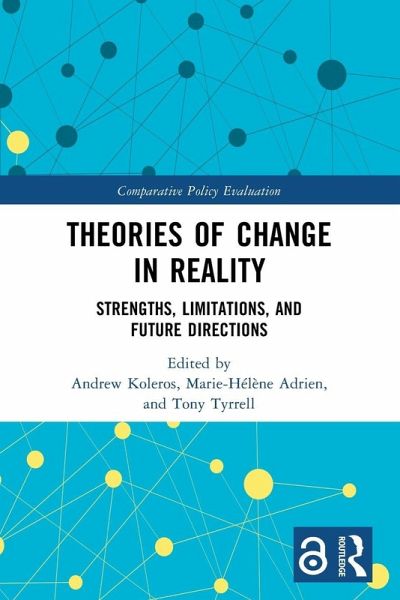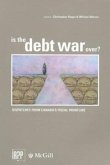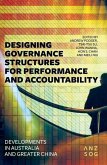Theories of Change in Reality
Strengths, Limitations and Future Directions
Herausgeber: Koleros, Andrew; Tyrrell, Tony; Adrien, Marie-Helene
51,99 €
inkl. MwSt.
Versandkostenfrei*
Erscheint vorauss. 1. Oktober 2025
Melden Sie sich
hier
hier
für den Produktalarm an, um über die Verfügbarkeit des Produkts informiert zu werden.

26 °P sammeln
Theories of Change in Reality
Strengths, Limitations and Future Directions
Herausgeber: Koleros, Andrew; Tyrrell, Tony; Adrien, Marie-Helene
- Broschiertes Buch
Theories of Change in Reality examines the usefulness of the approach that has been a foundation stone of Western evaluation for the past few decades. Answering three common questions across five core themes, experienced evaluators and voices of newer and emerging practitioners provide a 'state of the art' examination of theories of change.
Andere Kunden interessierten sich auch für
![Mohammedan Theories of Finance Mohammedan Theories of Finance]() Nicolas Prodromon AghnidesMohammedan Theories of Finance31,99 €
Nicolas Prodromon AghnidesMohammedan Theories of Finance31,99 €![From Policy to Administration From Policy to Administration]() From Policy to Administration36,99 €
From Policy to Administration36,99 €![Military Strategy: A Very Short Introduction Military Strategy: A Very Short Introduction]() Antulio J. EchevarriaMilitary Strategy: A Very Short Introduction9,99 €
Antulio J. EchevarriaMilitary Strategy: A Very Short Introduction9,99 €![The Challenge of Change The Challenge of Change]() David R. MetsThe Challenge of Change24,99 €
David R. MetsThe Challenge of Change24,99 €![Let Them Eat Carbon: The Price of Failing Climate Change Policies, and How Governments and Big Business Profit from Them Let Them Eat Carbon: The Price of Failing Climate Change Policies, and How Governments and Big Business Profit from Them]() Matthew SinclairLet Them Eat Carbon: The Price of Failing Climate Change Policies, and How Governments and Big Business Profit from Them15,99 €
Matthew SinclairLet Them Eat Carbon: The Price of Failing Climate Change Policies, and How Governments and Big Business Profit from Them15,99 €![Is the Debt War Over?: Dispatches from Canada's Fiscal Frontline Is the Debt War Over?: Dispatches from Canada's Fiscal Frontline]() Christopher RaganIs the Debt War Over?: Dispatches from Canada's Fiscal Frontline38,99 €
Christopher RaganIs the Debt War Over?: Dispatches from Canada's Fiscal Frontline38,99 €![Designing Governance Structures for Performance and Accountability: Developments in Australia and Greater China Designing Governance Structures for Performance and Accountability: Developments in Australia and Greater China]() Designing Governance Structures for Performance and Accountability: Developments in Australia and Greater China39,99 €
Designing Governance Structures for Performance and Accountability: Developments in Australia and Greater China39,99 €-
-
-
Theories of Change in Reality examines the usefulness of the approach that has been a foundation stone of Western evaluation for the past few decades. Answering three common questions across five core themes, experienced evaluators and voices of newer and emerging practitioners provide a 'state of the art' examination of theories of change.
Hinweis: Dieser Artikel kann nur an eine deutsche Lieferadresse ausgeliefert werden.
Hinweis: Dieser Artikel kann nur an eine deutsche Lieferadresse ausgeliefert werden.
Produktdetails
- Produktdetails
- Verlag: Taylor & Francis Ltd
- Seitenzahl: 266
- Erscheinungstermin: 1. Oktober 2025
- Englisch
- Abmessung: 229mm x 152mm
- ISBN-13: 9781032669625
- ISBN-10: 1032669624
- Artikelnr.: 70148790
- Herstellerkennzeichnung
- Libri GmbH
- Europaallee 1
- 36244 Bad Hersfeld
- gpsr@libri.de
- Verlag: Taylor & Francis Ltd
- Seitenzahl: 266
- Erscheinungstermin: 1. Oktober 2025
- Englisch
- Abmessung: 229mm x 152mm
- ISBN-13: 9781032669625
- ISBN-10: 1032669624
- Artikelnr.: 70148790
- Herstellerkennzeichnung
- Libri GmbH
- Europaallee 1
- 36244 Bad Hersfeld
- gpsr@libri.de
Andrew Koleros is a Principal Researcher at Mathematica with 20 years of experience in designing and delivering mixed-methods evaluations and programme monitoring, evaluation and learning systems for both small-scale and largescale social and economic development projects. He brings particular expertise in using theory-based approaches that integrate complexity concepts and systems thinking into programme and evaluation design processes to address complex societal problems from safe and affordable housing to youth employment to advancing health equity. He obtained his master's in public health from the Tulane School of Public Health and Tropical Medicine. He has published on his work in designing theory-based evaluation approaches in the American Journal of Evaluation, the Canadian Journal of Programme Evaluation and in multiple practitioner settings. He is a member of the American Evaluation Association, the European Evaluation Society, and the Canadian Evaluation Society. Marie-Hélène Adrien is a senior evaluation practitioner and researcher with 35 years of experience in evaluating the performance of programmes and institutions financed by bilateral and multilateral agencies and philanthropies around the globe. Dr. Adrien is a former CEO of the consulting firm Universalia Management Group in Montreal and was the President of the International Development Evaluation Association (IDEAS), as well as a professor of practice at the International Development Studies Program of McGill University. Tony Tyrrell is an independent consultant with more than 25 years' experience in evaluation and related fields. Tony's early experience in evaluation was with the European Social Fund Evaluation Unit where he produced influential evaluations on various subjects including early school leaving and local development. He later worked with a number of private consulting firms on strategic, policy, and programme evaluation and on performance management. More recently he spent six years with the Independent Evaluation Group at the World Bank Group (WBG). Tony now works as an independent consultant with various clients including the WBG, the Asian Development Bank, various governments, and private consultancies. He holds an MSc in Management (Organisation Behavior), and an MA in English Literature. Tony was co-editor (with Burt Perrin) of another book in this series, Changing Bureaucracies (2021).
Foreword
Emily Gates and Kathy Chau Rohn
Part 1. Introduction
Andrew Koleros, Marie-Hélène Adrien, and Tony Tyrrell
Part 2. Considerations in Using Theories of Change to Establish Causality
2. Theories of Change between Critical Thinking and Social Practices
Peter Dahler-Larsen
3. Setting the Stage for Contribution Claims
Thomas Delahais
4. Using Theories of Change to Assess Causality in a Policy Change Context
Carlisle Levine
5. How Deep is your Ontology? How a Little Ontological Thinking Can
Strengthen How Evaluators Use Theories of Change
Tom Ling
6. My Perspective on Theories of Change
Markus Palenberg
Part 3. Using Theories of Change to Understand Wider Social Change
Processes
7. Theory of Change for Sustainable Business
Jens Anderson
8. Upcycling TOC for Impact Investment and Early-Stage Ventures
Penny Hawkins and Zazie Tolmer
9. Strategy-level Theories of Change Require a Focus on Systems Change: An
Actor-Based Approach can Help
Andrew Koleros
10. Evaluating the use of Artificial Intelligence and Big Data (ai/bd) in
Policy Making: Unpacking Black-Boxes and Testing White-Boxes
Frans Leeuw
11. Developing, Representing and Using Theories of Change for Interventions
in Complex Systems Patricia Rogers
Part 4. Adapting Theories of Change for Use in Broader Public Policy
Contexts
12. Theories of Change in Evaluation of Local Government Reforms
Kurt Houlberg and Olaf Rieper
13. Theories-of-Change and the Evaluation of Sustainable Impact: Moving
beyond Simplicity in Development Cooperation
Peter van der Knapp
14. Use of Theory of Change as a Management Tool for Government Multi-year
Development Plans: The Case of Brazil's Federal PPA
Lycia Lima and Marina Lafer
15. Theories of Change in Complex Macro Public Sector Planning Settings in
Africa: How Useful are They?
Candice Morkel
16. Simple Heuristics for Drafting Theories of Change: A Case of Behavioral
Insights into Food Waste
Karol Olejniczak and Igor Lyubashenko
Part 5. Applying Theories of Change Approaches for Multiple Purposes
17. The Law of the Instrument: Would you Rather be a Theory or a Nail?
Gordon Freer
18. 3ie: A 'Balloon-Squeezing' Approach to the Theory of Change
Marie Gaarder
19. Integrating Theories of Change in Program Management and Delivery
Mark Oldenbeuving
20. Theories of Change: Who Needs Them? or: What Evaluators Can Learn from
Opera
Burt Perrin
21. How to Ensure No-one Uses Your Theory of Change: Lessons from the Front
Lines of ToC Facilitation and Possibilities for Renewal
Mary Tangelder
22. Why do we have ToCs of the Program Intervention but not of the
Intervention that is the Evaluation?
Bob Williams
Part 6. Developing Theories of Change Reflective of Multiple Stakeholder
Perspectives
23. Participatory Explorations of Alternative Futures: Using Narrative
Theories of Change
Rick Davies, Lara Mani and Tom Hobson
24. Constructing a Living Theory of Change in Fragile Contexts: Grounded on
Context, Problem and Evidence
Hur Hassnain
25. Flipping the Script on Program Theories: Advancing Towards
Transformative Theories of Change
Sebastian Lemire
26. Theory Based Evaluation Approaches Can Enable Online Project Success
Steve Montague, Heloise Emdon and Eva Grabinski
27. Theory of Change as a Tool for Tracking Intensive Family Program
Developments in Whitetown
Jane Mulcahey, Catherine Naughton and Sean Redmond
Conclusions
Andrew Koleros, Marie-Hélène Adrien, and Tony Tyrrell
Emily Gates and Kathy Chau Rohn
Part 1. Introduction
Andrew Koleros, Marie-Hélène Adrien, and Tony Tyrrell
Part 2. Considerations in Using Theories of Change to Establish Causality
2. Theories of Change between Critical Thinking and Social Practices
Peter Dahler-Larsen
3. Setting the Stage for Contribution Claims
Thomas Delahais
4. Using Theories of Change to Assess Causality in a Policy Change Context
Carlisle Levine
5. How Deep is your Ontology? How a Little Ontological Thinking Can
Strengthen How Evaluators Use Theories of Change
Tom Ling
6. My Perspective on Theories of Change
Markus Palenberg
Part 3. Using Theories of Change to Understand Wider Social Change
Processes
7. Theory of Change for Sustainable Business
Jens Anderson
8. Upcycling TOC for Impact Investment and Early-Stage Ventures
Penny Hawkins and Zazie Tolmer
9. Strategy-level Theories of Change Require a Focus on Systems Change: An
Actor-Based Approach can Help
Andrew Koleros
10. Evaluating the use of Artificial Intelligence and Big Data (ai/bd) in
Policy Making: Unpacking Black-Boxes and Testing White-Boxes
Frans Leeuw
11. Developing, Representing and Using Theories of Change for Interventions
in Complex Systems Patricia Rogers
Part 4. Adapting Theories of Change for Use in Broader Public Policy
Contexts
12. Theories of Change in Evaluation of Local Government Reforms
Kurt Houlberg and Olaf Rieper
13. Theories-of-Change and the Evaluation of Sustainable Impact: Moving
beyond Simplicity in Development Cooperation
Peter van der Knapp
14. Use of Theory of Change as a Management Tool for Government Multi-year
Development Plans: The Case of Brazil's Federal PPA
Lycia Lima and Marina Lafer
15. Theories of Change in Complex Macro Public Sector Planning Settings in
Africa: How Useful are They?
Candice Morkel
16. Simple Heuristics for Drafting Theories of Change: A Case of Behavioral
Insights into Food Waste
Karol Olejniczak and Igor Lyubashenko
Part 5. Applying Theories of Change Approaches for Multiple Purposes
17. The Law of the Instrument: Would you Rather be a Theory or a Nail?
Gordon Freer
18. 3ie: A 'Balloon-Squeezing' Approach to the Theory of Change
Marie Gaarder
19. Integrating Theories of Change in Program Management and Delivery
Mark Oldenbeuving
20. Theories of Change: Who Needs Them? or: What Evaluators Can Learn from
Opera
Burt Perrin
21. How to Ensure No-one Uses Your Theory of Change: Lessons from the Front
Lines of ToC Facilitation and Possibilities for Renewal
Mary Tangelder
22. Why do we have ToCs of the Program Intervention but not of the
Intervention that is the Evaluation?
Bob Williams
Part 6. Developing Theories of Change Reflective of Multiple Stakeholder
Perspectives
23. Participatory Explorations of Alternative Futures: Using Narrative
Theories of Change
Rick Davies, Lara Mani and Tom Hobson
24. Constructing a Living Theory of Change in Fragile Contexts: Grounded on
Context, Problem and Evidence
Hur Hassnain
25. Flipping the Script on Program Theories: Advancing Towards
Transformative Theories of Change
Sebastian Lemire
26. Theory Based Evaluation Approaches Can Enable Online Project Success
Steve Montague, Heloise Emdon and Eva Grabinski
27. Theory of Change as a Tool for Tracking Intensive Family Program
Developments in Whitetown
Jane Mulcahey, Catherine Naughton and Sean Redmond
Conclusions
Andrew Koleros, Marie-Hélène Adrien, and Tony Tyrrell
Foreword
Emily Gates and Kathy Chau Rohn
Part 1. Introduction
Andrew Koleros, Marie-Hélène Adrien, and Tony Tyrrell
Part 2. Considerations in Using Theories of Change to Establish Causality
2. Theories of Change between Critical Thinking and Social Practices
Peter Dahler-Larsen
3. Setting the Stage for Contribution Claims
Thomas Delahais
4. Using Theories of Change to Assess Causality in a Policy Change Context
Carlisle Levine
5. How Deep is your Ontology? How a Little Ontological Thinking Can
Strengthen How Evaluators Use Theories of Change
Tom Ling
6. My Perspective on Theories of Change
Markus Palenberg
Part 3. Using Theories of Change to Understand Wider Social Change
Processes
7. Theory of Change for Sustainable Business
Jens Anderson
8. Upcycling TOC for Impact Investment and Early-Stage Ventures
Penny Hawkins and Zazie Tolmer
9. Strategy-level Theories of Change Require a Focus on Systems Change: An
Actor-Based Approach can Help
Andrew Koleros
10. Evaluating the use of Artificial Intelligence and Big Data (ai/bd) in
Policy Making: Unpacking Black-Boxes and Testing White-Boxes
Frans Leeuw
11. Developing, Representing and Using Theories of Change for Interventions
in Complex Systems Patricia Rogers
Part 4. Adapting Theories of Change for Use in Broader Public Policy
Contexts
12. Theories of Change in Evaluation of Local Government Reforms
Kurt Houlberg and Olaf Rieper
13. Theories-of-Change and the Evaluation of Sustainable Impact: Moving
beyond Simplicity in Development Cooperation
Peter van der Knapp
14. Use of Theory of Change as a Management Tool for Government Multi-year
Development Plans: The Case of Brazil's Federal PPA
Lycia Lima and Marina Lafer
15. Theories of Change in Complex Macro Public Sector Planning Settings in
Africa: How Useful are They?
Candice Morkel
16. Simple Heuristics for Drafting Theories of Change: A Case of Behavioral
Insights into Food Waste
Karol Olejniczak and Igor Lyubashenko
Part 5. Applying Theories of Change Approaches for Multiple Purposes
17. The Law of the Instrument: Would you Rather be a Theory or a Nail?
Gordon Freer
18. 3ie: A 'Balloon-Squeezing' Approach to the Theory of Change
Marie Gaarder
19. Integrating Theories of Change in Program Management and Delivery
Mark Oldenbeuving
20. Theories of Change: Who Needs Them? or: What Evaluators Can Learn from
Opera
Burt Perrin
21. How to Ensure No-one Uses Your Theory of Change: Lessons from the Front
Lines of ToC Facilitation and Possibilities for Renewal
Mary Tangelder
22. Why do we have ToCs of the Program Intervention but not of the
Intervention that is the Evaluation?
Bob Williams
Part 6. Developing Theories of Change Reflective of Multiple Stakeholder
Perspectives
23. Participatory Explorations of Alternative Futures: Using Narrative
Theories of Change
Rick Davies, Lara Mani and Tom Hobson
24. Constructing a Living Theory of Change in Fragile Contexts: Grounded on
Context, Problem and Evidence
Hur Hassnain
25. Flipping the Script on Program Theories: Advancing Towards
Transformative Theories of Change
Sebastian Lemire
26. Theory Based Evaluation Approaches Can Enable Online Project Success
Steve Montague, Heloise Emdon and Eva Grabinski
27. Theory of Change as a Tool for Tracking Intensive Family Program
Developments in Whitetown
Jane Mulcahey, Catherine Naughton and Sean Redmond
Conclusions
Andrew Koleros, Marie-Hélène Adrien, and Tony Tyrrell
Emily Gates and Kathy Chau Rohn
Part 1. Introduction
Andrew Koleros, Marie-Hélène Adrien, and Tony Tyrrell
Part 2. Considerations in Using Theories of Change to Establish Causality
2. Theories of Change between Critical Thinking and Social Practices
Peter Dahler-Larsen
3. Setting the Stage for Contribution Claims
Thomas Delahais
4. Using Theories of Change to Assess Causality in a Policy Change Context
Carlisle Levine
5. How Deep is your Ontology? How a Little Ontological Thinking Can
Strengthen How Evaluators Use Theories of Change
Tom Ling
6. My Perspective on Theories of Change
Markus Palenberg
Part 3. Using Theories of Change to Understand Wider Social Change
Processes
7. Theory of Change for Sustainable Business
Jens Anderson
8. Upcycling TOC for Impact Investment and Early-Stage Ventures
Penny Hawkins and Zazie Tolmer
9. Strategy-level Theories of Change Require a Focus on Systems Change: An
Actor-Based Approach can Help
Andrew Koleros
10. Evaluating the use of Artificial Intelligence and Big Data (ai/bd) in
Policy Making: Unpacking Black-Boxes and Testing White-Boxes
Frans Leeuw
11. Developing, Representing and Using Theories of Change for Interventions
in Complex Systems Patricia Rogers
Part 4. Adapting Theories of Change for Use in Broader Public Policy
Contexts
12. Theories of Change in Evaluation of Local Government Reforms
Kurt Houlberg and Olaf Rieper
13. Theories-of-Change and the Evaluation of Sustainable Impact: Moving
beyond Simplicity in Development Cooperation
Peter van der Knapp
14. Use of Theory of Change as a Management Tool for Government Multi-year
Development Plans: The Case of Brazil's Federal PPA
Lycia Lima and Marina Lafer
15. Theories of Change in Complex Macro Public Sector Planning Settings in
Africa: How Useful are They?
Candice Morkel
16. Simple Heuristics for Drafting Theories of Change: A Case of Behavioral
Insights into Food Waste
Karol Olejniczak and Igor Lyubashenko
Part 5. Applying Theories of Change Approaches for Multiple Purposes
17. The Law of the Instrument: Would you Rather be a Theory or a Nail?
Gordon Freer
18. 3ie: A 'Balloon-Squeezing' Approach to the Theory of Change
Marie Gaarder
19. Integrating Theories of Change in Program Management and Delivery
Mark Oldenbeuving
20. Theories of Change: Who Needs Them? or: What Evaluators Can Learn from
Opera
Burt Perrin
21. How to Ensure No-one Uses Your Theory of Change: Lessons from the Front
Lines of ToC Facilitation and Possibilities for Renewal
Mary Tangelder
22. Why do we have ToCs of the Program Intervention but not of the
Intervention that is the Evaluation?
Bob Williams
Part 6. Developing Theories of Change Reflective of Multiple Stakeholder
Perspectives
23. Participatory Explorations of Alternative Futures: Using Narrative
Theories of Change
Rick Davies, Lara Mani and Tom Hobson
24. Constructing a Living Theory of Change in Fragile Contexts: Grounded on
Context, Problem and Evidence
Hur Hassnain
25. Flipping the Script on Program Theories: Advancing Towards
Transformative Theories of Change
Sebastian Lemire
26. Theory Based Evaluation Approaches Can Enable Online Project Success
Steve Montague, Heloise Emdon and Eva Grabinski
27. Theory of Change as a Tool for Tracking Intensive Family Program
Developments in Whitetown
Jane Mulcahey, Catherine Naughton and Sean Redmond
Conclusions
Andrew Koleros, Marie-Hélène Adrien, and Tony Tyrrell







